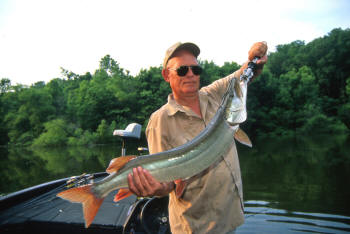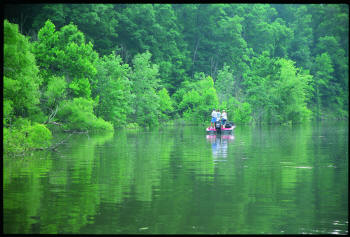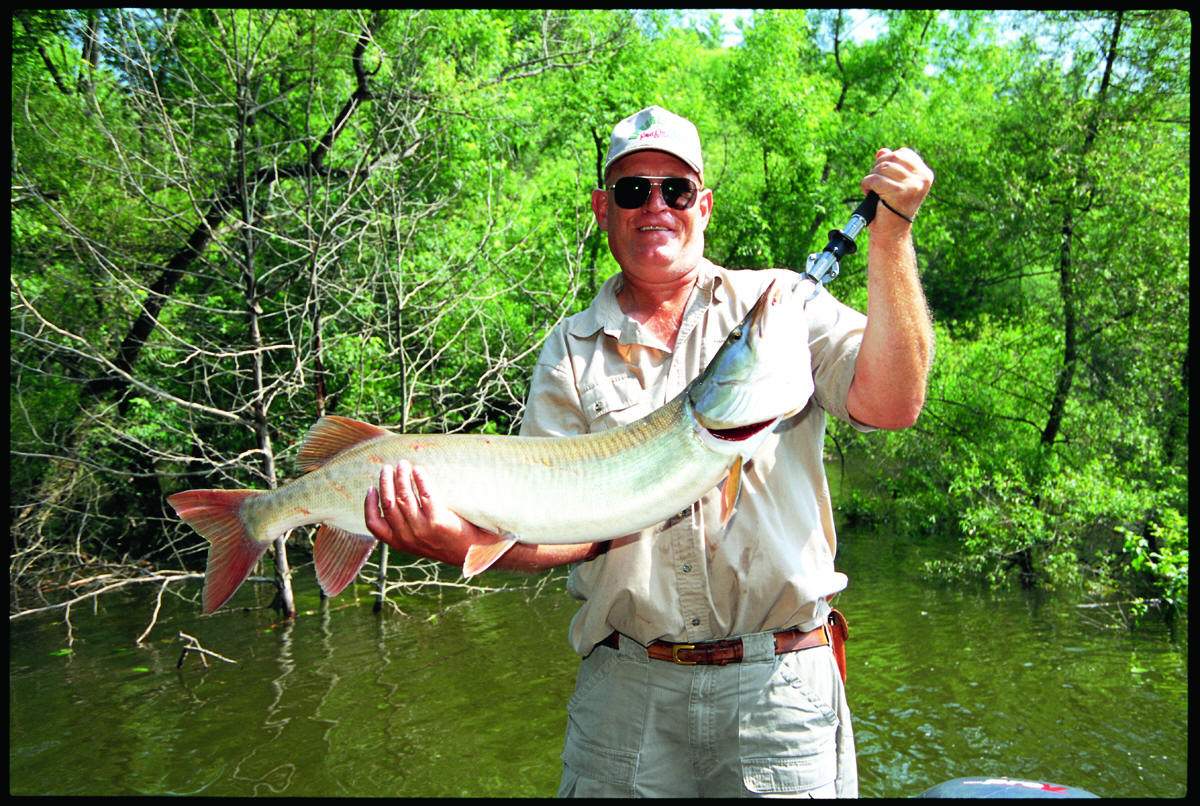 Fish of a Thousand Casts?
By Craig Ritchie
Fish of a Thousand Casts?
By Craig Ritchie
Not so in Kentucky, where it’s not
only possible to boat a dozen muskie a day but have an
honest crack at that trophy of a lifetime.
Stories about muskie are the stuff of legend. Fish of a
thousand casts. Anglers going a lifetime without ever
hooking one. Phooey on that.
Fact is, Kentucky anglers not only boat up to a dozen
muskie a day with scorching regularity, but have a
legitimate shot at bona-fide trophies pushing 50 inches
and 40 pounds.
I had heard about southern muskie fishing for years, and
finally got a chance to sample it first-hand in June
2004. My destination was Green River Lake, an 8,200 acre
impoundment on the historic Green River created by the
US Army Corps of Engineers. Considered the crown jewel
of Kentucky’s muskie waters, Green River Lake snakes
through the rolling countryside like a giant letter S.
My first priority was to hook up with Bill Jarboe, the
best muskie guide on the lake.
 After meeting Bill at Emerald Isle Marina and loading
his boat with ice-cold water and pop, we set out under a
brilliant sunny sky in perfect, flat calm weather. As we
only had a couple of hours to fish before dinner, I
jokingly told Bill that I needed photos and since the
light was just right, the pressure was on. Evidently,
pressure doesn’t bother Bill Jarboe a whole lot.
After meeting Bill at Emerald Isle Marina and loading
his boat with ice-cold water and pop, we set out under a
brilliant sunny sky in perfect, flat calm weather. As we
only had a couple of hours to fish before dinner, I
jokingly told Bill that I needed photos and since the
light was just right, the pressure was on. Evidently,
pressure doesn’t bother Bill Jarboe a whole lot.
We arrived at the entrance of a long, cone-shaped bay.
Bill rigged me up with a jointed Baby Depth Raider and
said we should begin by casting along the shoreline.
About 30 seconds later, I felt a solid thump and hooked
my first muskie of the trip. Bill just smiled as he put
his rod down on the deck and asked “That what you were
looking for?”
The muskie was a pretty fish alright – not a monster by
any means, but a thick, healthy looking fish that
probably weighed in the mid-teens. With the beautiful
tree-studded shoreline and the sun sitting low to the
west, casting that gorgeous golden light that always
looks so good in pictures, I couldn’t believe our good
fortune. For a fishing writer like me, photos mean
everything on these trips. With Bill holding the muskie
with the polish of a pro, I had all that I needed within
five minutes of leaving the dock.
“We do aim to please down here, you know,” Bill grinned
as he released the fish.
That muskie was the first of seven that we landed
between us in a little over two hours of fishing. Okay,
one was a little guy of about six pounds, but Bill had a
45-inch fish eat his Depth Raider within a rod-length of
the boat. All the rest were gorgeous muskies between 10
and 15 pounds – average fish for Green River Lake.
Back on shore over dinner, Bill gave me some background
on the fantastic fishing he enjoys year-round. Each
September or October the State stocks Green River Lake
with about 3,000 juvenile muskie in the 12-inch range.
With an enormous population of gizzard and threadfin
shad to feed on and relatively warm water year-round
(Green River Lake almost never freezes), the fish grow
quickly and attain solid weights. “The average muskie
here is about 37 to 40 inches long,” Bill told me. “But
we have a lot of much larger fish that would weigh
anywhere between 20 and 35 pounds, plus a few legit 40s.
If you put in the time, you’ll see them.”
 Bill fishes from a 19-foot bass boat and casts
exclusively. He generally works medium-sized,
deep-diving crankbaits like the small Swim Whizz or
six-inch Baby Depth Raider. “Because the muskies here
eat shad, I find that smaller baits work really well,”
he explains. “When muskie have schools of shad pushed
into bays or up against shore, the smaller lures will
produce more fish. They’re more like what the muskies
are naturally eating.”
Bill fishes from a 19-foot bass boat and casts
exclusively. He generally works medium-sized,
deep-diving crankbaits like the small Swim Whizz or
six-inch Baby Depth Raider. “Because the muskies here
eat shad, I find that smaller baits work really well,”
he explains. “When muskie have schools of shad pushed
into bays or up against shore, the smaller lures will
produce more fish. They’re more like what the muskies
are naturally eating.”
Because Green River Lake is an impoundment, the water
level fluctuates considerably over the course of the
year. According to the Corps of Engineers, Green River
Lake fluctuates from a minimum winter pool elevation of
664 feet above mean sea level (MSL) to a maximum flood
level of 713 feet above MSL. That’s a difference of 49
feet! This explains the lack of shoreline development
and local’s fondness of floating docks.
At the time of my visit, the water was up by more than
12 feet. While fishing the shoreline of one particular
bay, I was casting my lure over the tops of saplings
that were covered with bright green leaves. The
up-and-down water makes simply locating muskie the
greatest challenge you face. To further compound things,
current and water clarity changes with the overall
level. High water means stronger currents that stir up
sediment and reduce visibility. Low water usually means
the opposite – slow currents and tremendous clarity. As
conditions change, shad and muskie adapt. To catch
muskie consistently, you have to understand shad
movements and how changing water conditions affect their
location.
The next morning I was up bright and early, cameras
loaded with fresh film, and was on the dock at Emerald
Isle Marina a half-hour early. Bill and I had a full day
of fishing ahead of us, and after the previous evening’s
introduction, I couldn’t wait to get started. After
wolfing down a big breakfast (Bill insists you have to
be well fortified, perhaps a throwback to his former
life as a US Army Ranger) and after once again loading
the boat with cold drinks, we returned to the same bay
we fished the evening before.
About halfway along the shoreline a huge tree hung
precariously over the water, marking our starting point.
Bill’s plan was to work the shoreline from there right
down to the back end, where a small creek flowed into
the lake. Bill explained that the fertility afforded by
the creek would attract huge numbers of shad, so we
would work our way up it as far as the boat would go.
Then, we would turn around and circle back out,
repeating this basic course till we got tired of
catching fish.
You have to love that kind of confidence in a muskie
guide.
As if to prove he wasn’t just talking, we only went a
few yards down the shore when Bill hauled back on his
rod and grunted, “This is a good one.” Right on cue, the
fish went airborne – a gorgeous green muskie with
flaming red fins, easily 20 pounds, probably closer to
25.
 I reeled quickly to get my line out of the way so I
could take photos, a great plan till a muskie of around
eight pounds drilled my bait 30 feet from the boat and
also went airborne. Shocked, I didn’t even try to set
the hook, which was probably just as well. With Bill’s
fish thrashing all over the bay’s glassy surface, I was
quite relieved when my much smaller fish shook free.
I reeled quickly to get my line out of the way so I
could take photos, a great plan till a muskie of around
eight pounds drilled my bait 30 feet from the boat and
also went airborne. Shocked, I didn’t even try to set
the hook, which was probably just as well. With Bill’s
fish thrashing all over the bay’s glassy surface, I was
quite relieved when my much smaller fish shook free.
With Bill’s beautiful muskie safely landed, photographed
and released, I fired a cast back to the same area where
the small muskie hit, cranked the reel quickly to get
the lure down and immediately felt a solid, throbbing
weight. This time I was prepared, set the hook properly,
and had a beautiful muskie of my own to contend with. It
fought like a demon in the shallow water, with nowhere
to go except straight up. Bill asked me if I wanted a
photo holding the fish. After all, so far, all my
pictures were of him.
“Sure,” I replied, explaining how the camera worked
while trying to wrestle the fish boatside. Bill hit the
motor drive and I beamed while unhooking the fish and
returning it to Green River Lake.
The action continued consistently all morning long. We
had a double-header. At one point I hooked three muskies
on three consecutive casts. Bill boated another big
fish, pointing out its fin clips, evidence of the
State’s exceptional hatchery program. By the time we
broke for lunch, I was hooked.
With its year-round season and unique combination of big
numbers and large fish, Kentucky might just have the
hottest muskie fishing on the planet. Add in great food
and legendary southern hospitality, and you truly do
have the stuff of dreams.
FOR MORE INFO
Emerald Island Marina has great accommodations just
steps from the docks, or will rent you a houseboat so
you can live on the lake and fish around the clock. The
drive from the Toronto area is about 10 hours or so,
mainly on the I-75.
Call owner Terry Brown for pricing and availability
toll-free at 1-888-815-2000, or visit
www.emeraldisleresort.com .
You don’t absolutely need a guide to catch muskie on
Green River Lake, but a day or two with a pro cuts the
learning curve substantially. Because the water
fluctuates so much, location is everything, and a
professional guide like Bill Jarboe can mean the
difference between a trip you’ll never forget, and a
trip you wish you could forget. You can book Bill’s
services through Emerald Isle, or call him directly at
(270) 465-3788.


 Fish of a Thousand Casts?
By Craig Ritchie
Fish of a Thousand Casts?
By Craig Ritchie
 After meeting Bill at Emerald Isle Marina and loading
his boat with ice-cold water and pop, we set out under a
brilliant sunny sky in perfect, flat calm weather. As we
only had a couple of hours to fish before dinner, I
jokingly told Bill that I needed photos and since the
light was just right, the pressure was on. Evidently,
pressure doesn’t bother Bill Jarboe a whole lot.
After meeting Bill at Emerald Isle Marina and loading
his boat with ice-cold water and pop, we set out under a
brilliant sunny sky in perfect, flat calm weather. As we
only had a couple of hours to fish before dinner, I
jokingly told Bill that I needed photos and since the
light was just right, the pressure was on. Evidently,
pressure doesn’t bother Bill Jarboe a whole lot.  Bill fishes from a 19-foot bass boat and casts
exclusively. He generally works medium-sized,
deep-diving crankbaits like the small Swim Whizz or
six-inch Baby Depth Raider. “Because the muskies here
eat shad, I find that smaller baits work really well,”
he explains. “When muskie have schools of shad pushed
into bays or up against shore, the smaller lures will
produce more fish. They’re more like what the muskies
are naturally eating.”
Bill fishes from a 19-foot bass boat and casts
exclusively. He generally works medium-sized,
deep-diving crankbaits like the small Swim Whizz or
six-inch Baby Depth Raider. “Because the muskies here
eat shad, I find that smaller baits work really well,”
he explains. “When muskie have schools of shad pushed
into bays or up against shore, the smaller lures will
produce more fish. They’re more like what the muskies
are naturally eating.”  I reeled quickly to get my line out of the way so I
could take photos, a great plan till a muskie of around
eight pounds drilled my bait 30 feet from the boat and
also went airborne. Shocked, I didn’t even try to set
the hook, which was probably just as well. With Bill’s
fish thrashing all over the bay’s glassy surface, I was
quite relieved when my much smaller fish shook free.
I reeled quickly to get my line out of the way so I
could take photos, a great plan till a muskie of around
eight pounds drilled my bait 30 feet from the boat and
also went airborne. Shocked, I didn’t even try to set
the hook, which was probably just as well. With Bill’s
fish thrashing all over the bay’s glassy surface, I was
quite relieved when my much smaller fish shook free.